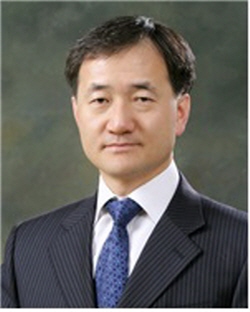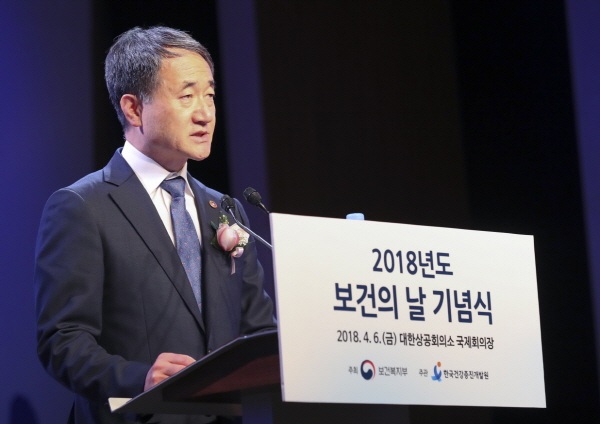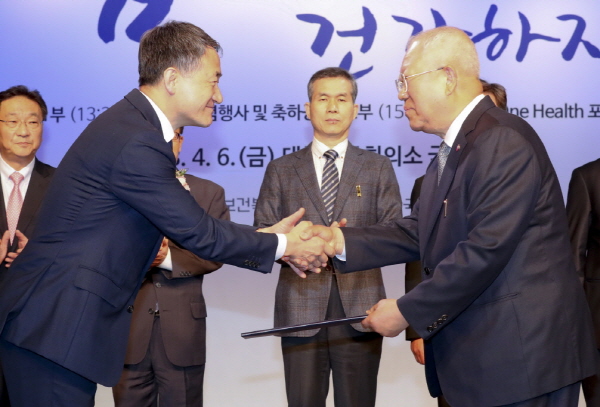To mark the 46th World Heath Day on April 7
On the occasion of the 46th World Health Day on April 7, the Ministry of Health and Welfare held the "One Health Forum" at the KCCI (Korea Chamber of Commerce and Industry) building in Seoul on April 6, 2018.
On the topic of ‘Universal Health Coverage (UHC),’ about 400 dignitaries and guests from the government and health and medical institutions, including Minister the Park Neung-hoo of Ministry of Health and Welfare, attended the annual event, managed by Korea Health Promotion Institute.

Since 1973, Korea has held the World Health Day event, which was designated by Work Health Organization (WHO), to reward and encourage those who contributed to improvement of people’s health and spread the climate for promoting people’s recognition of health.
The purpose of the forum was designed to share academic and theoretical backgrounds of the “One Health” access strategy to guarantee the people’s rights of health and necessities, seeking various ways for bilateral cooperation in many fields, a ministry spokesman said.
Prof. Woo Hee-jong of Seoul National University delivers a keynote speech on the “One Health” access strategy to guarantee the people’s rights of health.
Prof. Choi Bo-yul of Hanyang University, Prof. Kim Hong-bin and Prof. Kim Jae-hong of Seoul National University, Prof. Lee Duk-hwan of Sogang University and Prof. Chun Woo-taek of Yonsei University discussed and exchanged views on such subjects as antibiotic resistance, zoonotic infectious diseases, environmental health and social integration.

Related to this, the ministry has established a comprehensive plan to promote the people’s health with an aim to upgrade the age of health life from 71 in 2007 to 75 in 2020 and enhance health equity, the spokesman said.
Korea’s life expectancy is currently 82.4 years old, exceeding the 80.7 years averaged in OECD member countries. However, there is still a big gap of about 10 years between the life expectancy and the health life standing at 73.2 years. The health life refers to the period during which people can live healthy without disease or serious injury.
The ministry has pushed for building a lifelong health management system centering on advanced prevention to cope with major threats to health in regional societies, the spokesman said.
Thanks to improvement of income level and speedy development of medical techniques, Korea’s life expectancy has risen at a rapid pace. However, individuals’ health status tends to be stagnant or worsen.

For an instance, chronic diseases account for 81.2% of the total deaths in Korea and seven out of the top 10 causes of death are chronic diseases, showing a high prevalence and disease burden.
In Korea, particularly, the death rate from diabetes ranked seventh with 28.9 persons and that from cerebrovascular diseases ranked 10th with 71.6 persons, higher than the OECD average.
Mainly affected by such bad health patterns as a reduction in physical activities and an increase in fat intake, the prevalence rate of chronic diseases such as obesity and high blood pressure seems to have gone up, the spokesman explained.
In 2016, the obesity prevalence rate was 43.3% for adult males aged over 30 and the high blood pressure prevalence rate stood at 35%.
In particular, the smoking rate of males aged over 15 came to 36.6% in Korea, ranking third among OECD member countries. Moreover, the smoking problem for adolescents is very serious.
In line with this, Korea agreed on the ratification of the World Health Organization Framework Convention on Tobacco Control (WHO FCTC) in May 2005, a treaty adopted by the 56th World Health Assembly held in Geneva, Switzerland in May 2003. It had been signed by 168 countries.
In 2012, the fifth WHO FCTC general assembly meeting was held in Seoul, adopting a protocol to eliminate illicit trade in tobacco products.
Meanwhile, despite the downward trend of the suicide death rate, Korea’s suicide death rate ranked first with 25.6 persons per 100,000 persons, much higher than the OECD average of 12 persons, keeping the dishonorable top ranking for the 13th consecutive year.
As suicide has multiplicative factors, cooperation from across-the-board society and government agencies is necessary. Accordingly, the ministry plans to map out a tailor-made prevention strategy to prevent suicide.
In the future, the ministry will push for a health welfare convergent health policy that people can experience in their daily life, the spokesman said.
To this end, it plans to offer the health promotion service with a high satisfaction degree through the construction of residents-oriented tailor-made health management system.
Considering health risk factors by sex and age, the ministry projects to design health examination and link it with post management, while preparing for town clinic-oriented persistent and comprehensive chronic disease management system.
Along with this, the ministry will make a strong push for a warm health policy focusing on physical and mind health. Related to this, it already mapped out a national action plan to prevent suicide on Jan, 23, 2018. Under the plan, it will build a pan-society countermeasure system against suicide and propel the community-centered suicide prevention policy through strategic approach based on scientific basis.

